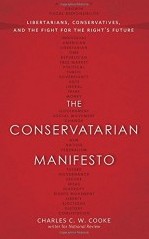The Conservatarian Manifesto: Libertarians, Conservatives, and the Fight for the Right’s Future
In considering Charles C.W. Cooke’s argument in his recent book The Conservatarian Manifesto, one is reminded of an encounter between Frédéric Chopin and a woman who asked why, after performing his beautifully somber nocturnes and etudes, he should not try his hand at composing an opera or symphony. Chopin famously replied, “Madame, my kingdom is a small one, but I am king there.”
Monarchistic ironies aside, the exchange over Chopin’s little kingdom serves well to elucidate Cooke’s assertion that “Republicans must reestablish themselves as the party of liberty, demonstrating to a skeptical, but interested electorate that they are committed to laissez-faire; that they can address their political blind spots; that they are interested in – and tolerant of – how others wish to live their lives but that they have their own way of dealing with that; that their talk of local control is not merely a ruse; and, crucially, that they do not believe that they have all of the answers to the world’s problems.” Parsing his argument reveals that in our contemporary political milieu of ephemeral –isms, only one stands out with any driving significance: federalism. For Cooke, the best of what American conservatism and libertarianism offer together is the promise that each individual citizen can be master of his or her own little kingdom and no one else’s.
A writer for National Review and frequent guest on the BBC, Fox News, MSNBC, and HBO’s Real Time with Bill Maher, it should come as no surprise that The Conservatarian Manifesto provides apt research and sound logic. From this logocentric premise he finds common ground between conservatism and libertarianism which derives from a foundational ideology of limited government reflecting a limited human nature.
Interestingly enough, The Conservatarian Manifesto reads nothing like a manifesto. The use of the term certainly is a tongue-in-cheek ploy as the irony of American conservatism is that it is a radical anomaly in the broad scope of global political history. Cooke states in his introduction “that in America the friends of liberty are called ‘conservatives’ and the centralizing authoritarians are referred to as ‘liberals’ is one of the great semantic jokes of history.” Leading with this crucial point is fitting as the book dispels with semantics and instead seeks to return to the founding principles shared by conservatives and libertarians alike.
Split into ten chapters, readers will observe that the book truly consists of two parts: the first on conservatarian ideology and the second on that ideology’s application to contemporary American domestic and foreign policy. Of course Cooke criticizes the anti-federalist policies of President Barack Obama’s administration, but perhaps unexpectedly for some readers he deals out an equal amount of criticism to the administration of President George W. Bush for its policies that grew rapidly the size and centralizing authority of the federal government. After establishing his argument in the first five chapters, Cooke illustrates policy successes and failures in gun control, the drug wars, gay marriage, abortion, foreign policy and others that seek to reverse this trend.
Though Cooke provides insightful analysis of policy through his conservatarian perspective, the book at times wants of further elaboration and consideration of problematic particulars. In his seventh chapter, he proposes an end to the “War on Drugs” through a relocation of drug laws to individual states. Although a logical argument in principle, the proposal nevertheless fails to mention the inevitable problems that would surely arise between state and federal jurisdictions in regards to national borders and maritime law. The example serves to illustrate how the drug war not only requires a consideration of the relationship between the responsibilities of the federal government and the states (not to mention the limited resources of states compared to federal agencies), but also that policy discussions are not easily compartmentalized. Issues like the drug wars are not simply restricted to discussions of drug legalization, but also require considerations of the legitimate responsibility of the federal government to protect national borders.
Yet this is not necessarily a weakness in Cooke’s line of argumentation. For if examples like chapter seven force examinations of the proper roles of individual state and federal governments, then this is actually a major success of the book rather than a glaring error. Rather than a full analysis of policy, or a full treatise on political philosophy, the hybrid nature of the book provides a unique and tangible connection between the founding principles of federalism and their possible contemporary applications.
In the tradition of conservatism, Cooke provides no single centralizing solution to the problems he presents. Instead readers should expect a well-crafted, dispassionate call for a return to America’s federalist origins. On his podcast Mad Dogs and Englishmen, which he co-hosts with Kevin D. Williamson, Cooke recently said that the right loves “the hard limiting of government and the protection of localism.” Those looking at the desolate state of liberty in the current American political landscape and wondering which direction the Republican Party should take would do well to read The Conservatarian Manifesto and its principled trajectory towards this localism.
CBC original book review written by Eric Bledsoe.
- The Author

Charles Cooke
Charles C. W. Cooke is a writer at National Review and a graduate of the University of Oxford, at which […] More about Charles Cooke.














